The Guardian‘s Joe Queenan is brutally writing off Scarlett Johansson…dissing, dismissing…tossing her onto the slag heap. “Somewhere along the line” — right after Lost in Translation, he means — “people who should have known better began to cast Johansson in roles for which she was not suited. And once the actress was asked to play anyone other than a 20-something Yank born and raised on the east coast in the waning years of the 20th century, it became apparent that she wasn’t much of an actress.
“Listless and vacant in The Girl With The Pearl Earring, Johansson was hopelessly miscast as an action babe in The Island, passive and useless in Woody Allen‘s Match Point” — not true at all! Johansson is almost Brando-esque in that film –“thoroughly implausible in Allen’s wretched Scoop, ridiculously out of her league as a postwar vamp in Brian de Palma‘s abysmal The Black Dahlia, and now entirely extraneous as a duplicitous magician’s assistant in The Prestige.
“Basically, her acting repertory consists of staring intently at the person she is speaking to, keeping her lips spread apart, and hoping no one will notice that she is no threat to Meryl Streep, and not all that much of a threat to Hilary Duff. Increasingly, the very fact that Johansson is in a film suggests that it will not make very much money, not be any good, or both. Because Johansson has made so many movies in such a short period of time, and because most of them have been so bad, and because several of these movies have been outright disasters at the box office, it’s starting to look like the actress is the kiss of death.”
wired
O’Toole moved to GG Drama category
The Envelope‘s Tom O’Neil is reporting that Miramax strategists yesterday decided to not submit Venus star Peter O’Toole in the Golden Globe competition for a Best Actor in a Comedy category, apparently out of concern that Sacha Baron Cohen‘s Borat performance might ace him out. So they’ve entered O’Toole into the Best Actor in a Drama category instead.
To which I can only wonder why Miramaxers thought O’Toole should have been in the Best Actor in a Comedy slot in the first place. Venus is amusing here and there — arch, whimsical, spirited — but there’s no way anyone in a sober state of mind would call O’Toole’s performance even somewhat comedic. Venus is a drama with fizz and bittersweet spritz, but O’Toole’s playing a withered actor who’s getting closer and closer to death, and yet is clinging to life all he can through his feelings of lust and affection for a young girl. A touching situation but hardly a “funny” one.
O’Neil mentions that the Hollywood Foreign Press Association’s eligibility committee might not agree with the switch and move O’Toole back to comedy, although it usually defers to the preference of the contender. This is insane.
Good Shepherds everywhere
At the very end of Universal’s The Good Shepherd trailer a subtitle appears: The Untold Story About the Birth of the CIA. Well, yeah…I guess. But Robert De Niro‘s spy drama is basically a psychological portrait of a generic workaholic, and the theme is about how an insatiable need for work, earnings, discipline and productivity has a way of eventually separating the workaholic from everything and everyone else. It’s a portrait, in short, of tens of millions of people out there whose marriages are slowly dying on the vine, whose children are growing up alone, whose health is suffering because they eat obsessively and don’t work out enough (if at all). That’s the thread in this film. The late 40s to early ’60s historical CIA stuff (i.e., the particulars about James Jesus Angleton, the real-life spook played in the film by Matt Damon) comes second.
Busch sues Ovitz
Former Los Angeles Times, Variety and Entertainment Weekly reporter Anita Busch — whom accused wiretapper Anthony Pellicano tried to intimidate a few years ago with that dead fish “STOP!” message left on the windshield of her car — has alleged in a civil lawsuit that former CAA honcho and talent manager Michael Ovitz “participated with indicted private investigator Anthony Pellicano and others to intimidate and threaten her.”
Ovitz’s attorney James Ellis told L.A. Times reporters Andrew Blankstein and Greg Krikorian that his”client “had nothing to do with this. It’s unfortunate that Ms. Busch has chosen to involve him in this matter.”
The idea is to make Ovitz sweat his past offenses and presumably squeeze him for some kind of cash settlement. We all know Ovitz sent Busch that bottle of MSG years ago (she’s lethally allergic to the stuff) and that she’s never had much affection for him either. All fair-minded people hope Bush achieves her goals in this matter because she’s basically conducted herself honorably and because people who strive to intimidate the press deserve the blowback.
Dargis on Rossellini
In Open City, Paisan, Europa, Stromboli and other films by legendary Italian neorealist Roberto Rossellini, the “reality principle is ephemeral and profound. He helped usher the world back into cinema by mixing authentic people and locations in with actors and studio sets. But neo-realist directors like Rossellini and Vittorio De Sica do not, to paraphrase the critic Andre Bazin, simply deck out a formal story with touches of reality, as if reality were bits of tinsel.
“Instead, they offer fragments of reality that retain all of its mystery and ambiguity and whose meaning we piece together, much as the characters do. Others put reality, Bazin writes, ‘in a cage or teach her to talk, but De Sica talks with her, and it is the true language of reality that we hear, the word that cannot be denied, that only love can utter.'” — from a piece by N.Y. Times critic Manohla Dargis about a forthcoming Rossellini retrospective at the Museum of Modern Art.”
Dreamgirls via Steve Daly
Entertainment Weekly‘s Steve Daly has been shown Dreamgirls (DreamWorks, 12.15) and has seen “some arresting stuff,” he proclaims. But he doesn’t explain in great detail what stuff he’s talking about. The piece is basically a blah-blah tap dance that delivers almost nothing. In terms of what we want to hear, I mean.

There are two minor chickenshit reveals. Daly writes that Beyonce Knowles is “resplendent in a disco-era silver-lame cape and long, corkscrew-curl wig.” He also says costar Jennifer Hudson kicks splendid ass. Daly declares that “judging from an early look at Dreamgirls, director Bill Condon ‘s “crash course [with Hudson]” — goading her into some flamboyant attitude and bitchy behavior — “worked spectacularly well.”
And that’s all. The world is hungering for a seasoned, sophisticated opinion about a film Daly knows full well is being looked to as the last possible hope for a Best Picture slam-dunk (or not) and he all he can do is give an “attagirl!” to Hudson and describe Beyonce’s gown and wig.
No other observations, anecdotes or judgments are rendered about the finished film. Too early, I guess. (Even though it’s being shown to the world starting this Sunday.) The rest of the story is all backstage stuff, and it’s not that arresting.
Farewell Jack Palance
A fond farewell to Jack Palance, a great character actor whom, during his heyday in the ’50s and ’60s, exuded a sublime aura of sinister silkiness. Palance, a big guy with cheekbones you could shave roast beef with, died today at age 85 (or possibly 87) at his home in Montecito, near Santa Barbara.

Palance’s first big career score was playing the hired gun “Jack Wilson” in George Stevens ‘ Shane, a guy so creepy and reptilian that a dog in the film would always get up and leave the room when he walked in. He has a great showdown scene with Elisha Cooke, Jr., slowly putting on his black gloves and drawing his big six-shooter like lightning, and then waiting a couple of seconds before drilling Cooke and sending him flying backwards into the mud. (The gun sounds like a two-ton cannon.)
In another scene Palance mounts a horse like a lizard, pulling himself up and then freezing for three or four seconds before swinging his legs over and climbing into the saddle — one of the most brilliant bad guy bits ever delivered in a western.
40 years later Palance won a Best Supporting Actor Oscar for his performance as “Curly Washburn” in City Slickers, opposite Billy Crystal.
Palance’s Wikipedia bio reads as follows: “Stepping onstage to accept the award, the intimidatingly fit 6′ 4″ actor looked down at the 5′ 7” Crystal, and joked, ‘Billy Crystal… I crap bigger than him.’ He then dropped to the floor and demonstrated his ability, at age 73, to perform one-handed push-ups.
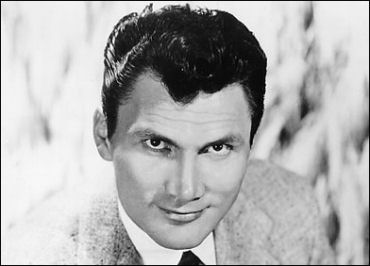
“Crystal then turned this into a running gag. At various points in the broadcast, he announced that Palance was backstage on the Stairmaster; had ‘just bungee-jumped off the Hollywood sign‘; had rendezvoused with the Space Shuttle in orbit; had fathered all the children in a production number; had been named People magazine’s Sexiest Man Alive; and had won the New York primary election. At the end of the broadcast, Crystal told everyone he’d like to see them again ‘but I’ve just been informed Jack Palance will be hosting next year.’
“The following year, host Crystal arrived on stage atop a giant model of the Oscar statuette, towed by Palance with a rope in his mouth.”
I always found Palance’s performance in Tim Burton‘s Batman to be irritatingly over-mannered, but I liked him a lot in Robert Aldrich‘s Attack, Jean Luc Godard‘s Contempt and Richard Brooks‘ The Professionals.
The son of a Ukranian coal miner, Palance’s birth name was Volodymyr Palanyuk.
Siddig and “Nativity”
Catherine Hardwicke‘s The Nativity Story (New Line, 12.1) has screened this week and will junket this weekend, and I’ve been told “it’s a very nicely made Christmas movie…it’s one of those films that The Passion has begotten and is clearly aimed at the audience that loved that film. It definitely delivers a traditional spiritual capturing of Christmas, which is something Hollywood rarely does.”
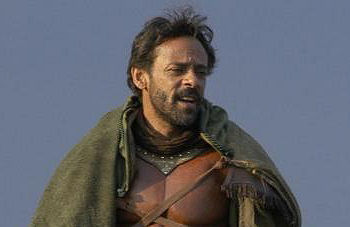
Alexander Siddig
He’s saying, in other words, that it’s sweeter (his first term was “more sugar coated’) than, say, Martin Scorsese‘s The Last Temptation of Christ. “It’s very well made but it’s definitely not dark or plain…it’s more traditional,” he says. Meaning it’s fairly literal-minded in terms of the Biblical iconography. The film stops short of what director William Wyler did in his depiction of the Nativity scene in Ben-Hur, which was to have a moving star literally travel across the heavens and then stop and beam a kind of spotlight down upon the manger, “but it has a lot of shots ot the heavens with Bibilical connotations.”
He says Hardwicke even plays one of the familiar Christmas hymns — he couldn’t remember if it was “O Little Town of Bethlehem” or one of the others — on the soundtrack as Mary and Joseph (Keisha Castle Hughes, Oscar Isaac) make their way to Egypt.
I was intrigued to learn that Alexander Siddig, the North African-born, English- educated actor who was very fine in Syriana and Kingdom of Heaven, plays the angel Gabriel in Hardwicke’s film. A friend who’s seen The Nativity Story thought he might be playing God since he isn’t identified as Gabriel — he doesn’t introduce himself and he’s not carrying a brass horn of any kind — but the IMDB says he’s playing Gabriel so let’s go with that.
Floating and (naturally) ethereal, a bearded Siddig appears before Mary and Joseph toward the end to explain the basic divinity-of-Jesus plan, the virgin conception, what’s literally to come. This news is profoundly comforting to Joseph, who’s been clueless and confused up to this point.
Mike Rich‘s screenplay for the film was originally called Nativity — obviously a simpler, cleaner title. I wonder what genius-brain producer or New Line exec suggested adding the “The” and “Story”, and what his/her reasoning might have been?
Leaking “Apocalypto”
“The Apocalypto word has seeped out,” writes Variety editor Peter Bart. “Small screenings of the still-uncompleted film are quietly taking place, [and] from Mel Gibson‘s dark, troubled mind has emerged yet another brilliant exercise in filmmaking, extremely violent, yet compelling. The inner demons that play havoc with his personal life continue to energize his creative vision.
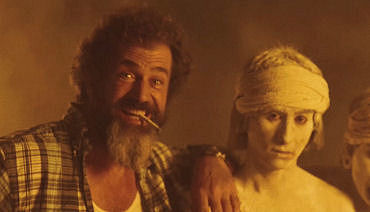
“But how will his work be judged? The film is being released not just as Apocalypto, but as Mel Gibson’s Apocalypto. Will the very community that understandably has been offended by Gibson’s inebriated diatribes be willing to pass fair judgment on his artistic contributions?”
Perhaps not, but Hollywood Elsewhere can…or would, rather, if the people at Disney publicity had the elemental moxie to get in touch with guys like me and show it under the usual circumstances. A friend doubts that Disney is running, and that Mel ‘s emissaries at Icon Productions are probably pulling the strings.
“The film itself represents a defiantly maverick voice,” Bart says. “Subtitles run throughout. The cast is totally non-professional. The action is virtually nonstop and the confrontations brutal.
“A fiercely original work like this normally would be screened and promoted for Oscar nominations and critics plaudits. This will not be the case with Gibson’s film. Hence, the looming Apocalypto Syndrome: Mel Gibson is not exactly a poster boy for tolerance. And that’s the paradox: Acceptance of his work demands exactly that.”
“Borat’ cretin lawsuit
Those erudite and sophisticated young men who shared a scene in a trailer with Sacha Baron Cohen in the last third of Borat — you know, the ones who somehow come off as drunken low-life cretins — are suing everyone, says TMZ.com, because they claim they were told the film wouldn’t be shown in the U.S. and they’re embarassed. These guys are obviously animals (they make John Belushi‘s Bluto look like Averell Harriman) and yet they’re claiming they’ve suffered “humiliation, mental anguish, and emotional and physical distress, loss of reputation, goodwill and standing in the community…” because the movie has been released in the U.S.
Lynch and his cow
Defamer’s Mark Lisanti reported yesterday that Inland Empire director David Lynch is “RIGHT NOW sitting on the corner of Hollywood and La Brea with a cow on a leash and a picture of Laura Dern that says ‘For Your Consideration.'” Lynch is obviously desperate, but his oddball streak is why most of us love the guy and a stunt like this is vintage.
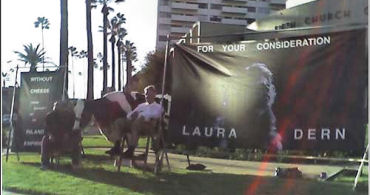
Lynch “also has a sign that says ‘without cows there would be no cheese in the Inland Empire.’ This is one of those things that a person needs to see. I wish I wasn’t chained to a desk.'” This sounds better than Terry Gilliam panhandling for quarters in Manhattan. I’m sorry I wasn’t faster on the draw. Too bad somebody with Lynch didn’t put out an advance notice of some kind.
Ridley on Modern Niggers
“Black America should have been singing hosannas about the ascendancy of Condoleezza Rice” because “it is time to celebrate the New Black Americans — those who have sealed the Deal, who aren’t beholden to liberal indulgence any more than they are to the disdain of the hard Right,” screenwriter John Ridley has written in the December Esquire. “It is time to praise blacks who are merely undeniable in their individuality and exemplary in their levels of achievement.
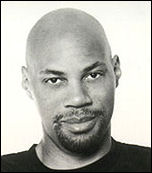
“But Condi was Republican. So never mind. Never mind she’d spent a lifetime facing down racism. Born in Birmingham at the peak of race hate, Condi was a schoolmate of Denise McNair, one of the ‘four little girls’ bombed to death in September of ’63 at the Sixteenth Street Baptist Church. [But] niggers and old-school shines couldn’t abide her.
“Same as with Clarence Thomas, they let her politics obfuscate her accomplishments. They stamped her: Not Officially Black. Loggers tagged her a ‘Sally Hemming for the 21st Century.’ Left-leaning pundits smeared her with the slurs ‘Aunt Jemima’ and ‘brown sugar.’ Julian Bond, reaching deep into the old-school bag of tricks, turned to rhyme to asperse Dr. Rice’s authenticity: ‘Just because they are your skin folks, doesn’t mean they’re your kinfolks.'”
The title of Ridley’s piece is “The Manifesto of Ascendancy for the Modern American Nigger.”
